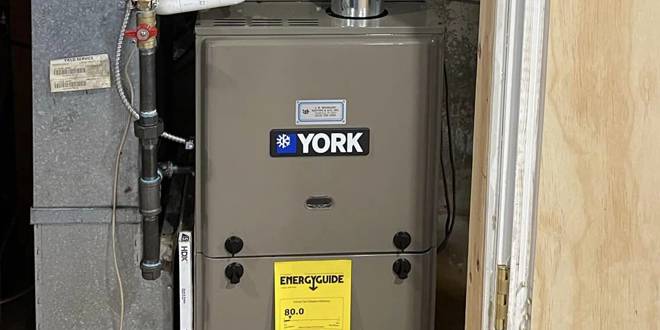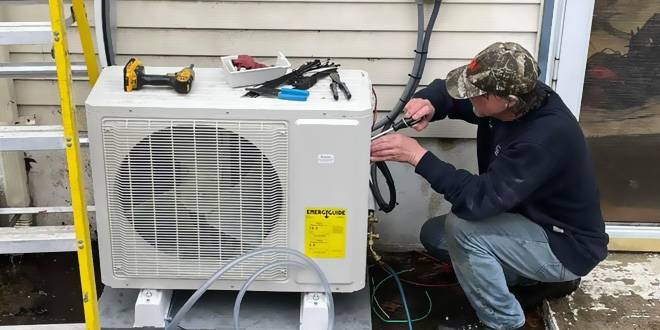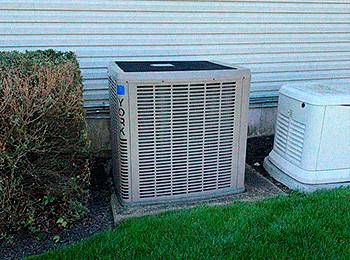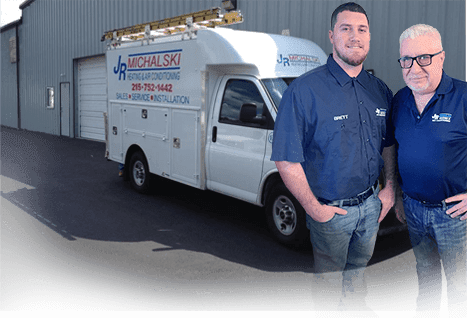
In Langhorne, PA, where the weather can be unpredictable, maximizing your HVAC system’s efficiency is key to maintaining comfort while keeping energy costs low. This guide offers 10 essential tips for enhancing your HVAC efficiency, ensuring your home or business stays comfortable year-round without breaking the bank.
Detailed Energy Saving Tips For HVAC Efficiency
1. Regular Maintenance
Annual Professional Check-ups: A yearly service by a certified HVAC technician can catch issues before they become major problems, ensuring your system operates at peak efficiency. This includes checking coolant levels, inspecting electrical components, and cleaning coils.
Air Filter Maintenance: Dirty air filters restrict airflow, forcing your system to work harder. By replacing or cleaning filters every 1-3 months, you can improve air quality and system efficiency, leading to lower energy bills and a longer lifespan for your HVAC unit.

2. Smart Thermostat Installation
Automated Temperature Control: Smart thermostats learn your schedule and adjust heating and cooling automatically, ensuring you’re not wasting energy when the house is empty. Many models allow remote control via smartphone apps, providing convenience and further opportunities for energy savings.
Energy Usage Reports: Some smart thermostats offer detailed reports on your energy consumption, helping you identify additional ways to save energy.
3. Seal and Insulate Ductwork
Leak Prevention: Sealing ductwork with mastic sealant or metal tape can prevent air leaks, especially in unconditioned spaces like attics or crawl spaces, where lost air means lost money.
Duct Insulation: Insulating your ductwork reduces heat loss in winter and heat gain in summer, ensuring that air delivered to your living spaces is as close as possible to the desired temperature.
4. Utilize Ceiling Fans
Enhanced Air Circulation: Ceiling fans help distribute conditioned air more evenly throughout your rooms, allowing you to feel cooler in the summer even with higher thermostat settings.
Winter Benefit: Reversing the direction of the fan in winter can push warm air down from the ceiling, allowing for lower heating settings.
5. Optimize Your Home’s Insulation
Whole-Home Comfort: Adding insulation to attics, walls, and floors keeps the desired temperature in your home more constant. By reducing the exchange of heat through the building envelope, your HVAC system requires less energy to maintain comfort.
Energy Audit: Consider a professional energy audit to identify areas where insulation could be improved, maximizing your investment.
6. Install Energy-Efficient Windows
Minimize Heat Transfer: Double-pane windows, especially those with low-E coatings, can significantly reduce the amount of heat that enters or leaves your home, leading to substantial energy savings in both heating and cooling seasons.
Sealing Gaps: Ensure that all windows are properly sealed to prevent drafts that can undermine your HVAC system’s efficiency.
7. Use Window Treatments
Sunlight Management: Effective use of blinds, curtains, and shades can block out heat from the sun during the hottest parts of the day in summer, reducing the need for air conditioning. In winter, opening window treatments on sunny days can provide natural warmth.
Insulating Properties: Some window treatments offer additional insulation, helping to keep warm air inside during the winter and hot air outside during the summer.
8. Ventilation Improvements
Kitchen and Bath Fans: Use exhaust fans to remove excess humidity and heat from cooking and showering, which can help your air conditioning system operate more efficiently.
Whole-House Ventilation: Consider installing a whole-house ventilation system, such as an ERV (Energy Recovery Ventilator), which exchanges indoor and outdoor air efficiently while conserving energy.
9. Adjust Your Thermostat Wisely
Seasonal Settings: In winter, aim for 68°F when you’re awake and lower when asleep or away. In summer, 78°F is recommended when home and higher when away. These settings optimize comfort and savings.
Programmable Thermostats: If you don’t have a smart thermostat, a programmable one can still offer significant savings by following your scheduled settings.
10. Upgrade to Energy-Efficient HVAC Systems
Modern Efficiency: Newer HVAC models are significantly more efficient than older ones, thanks to advancements in technology. Look for systems with a high SEER (Seasonal Energy Efficiency Ratio) rating for cooling and a high AFUE (Annual Fuel Utilization Efficiency) rating for heating.
Professional Installation: Ensure that your new system is correctly sized and installed by a professional, as improper installation can negate efficiency benefits.

FAQ: Saving Energy with Your HVAC Systems
How can I save energy with my HVAC system without sacrificing comfort?
Adjust your thermostat: Setting your thermostat to the highest comfortable temperature in summer and the lowest in winter can significantly reduce energy usage. Utilizing programmable or smart thermostats can automate this process for you.
Use ceiling fans: Fans can make a room feel cooler in the summer and distribute warm air in the winter, allowing you to adjust your thermostat settings accordingly.
What maintenance tasks are essential for energy efficiency?
Regular filter changes: Clean or replace your HVAC filters every 1-3 months to maintain airflow and system efficiency.
Annual professional check-ups: Have a professional service your HVAC system at least once a year to ensure it’s running efficiently and to address any potential issues.
Can sealing and insulating my home really impact HVAC energy use?
Absolutely. Sealing leaks around windows, doors, and ductwork, and adding insulation in key areas like attics and walls, can prevent heat transfer. This means your HVAC system doesn’t have to work as hard to maintain your desired indoor temperature, leading to significant energy savings.
How does a smart thermostat save energy?
Learning capabilities: Smart thermostats can learn your schedule and preferences, automatically adjusting the temperature when you’re asleep or away.
Remote control: They allow you to adjust settings remotely, ensuring you’re not cooling or heating an empty house.
Energy reports: Many smart thermostats provide detailed energy usage reports, helping you identify additional ways to save.
Is upgrading to an energy-efficient HVAC system worth the investment?
Yes. While the upfront cost can be higher, energy-efficient systems consume less energy to achieve the same level of comfort as older, less efficient models. This can lead to lower utility bills and a smaller carbon footprint over time.
What role does ventilation play in HVAC energy efficiency?
Improves air quality: Proper ventilation helps control humidity levels and remove indoor pollutants, reducing the workload on your HVAC system.
Reduces cooling needs: Using exhaust fans in kitchens and bathrooms can remove excess heat and moisture, making it easier to maintain comfortable temperatures.
Can window treatments really affect HVAC efficiency?
Indeed. Blinds, curtains, and shades can block or allow sunlight to help control your home’s temperature naturally. In summer, blocking direct sunlight can reduce cooling needs, while in winter, allowing sunlight in can reduce heating demands.
How does the size of my HVAC system affect energy efficiency?
Proper sizing is crucial: An oversized system can lead to short cycling, where the system turns on and off frequently, wasting energy. Conversely, an undersized system may run continuously, struggling to maintain the desired temperature. Both scenarios can lead to increased energy use and reduced system lifespan.
What is the most energy-efficient temperature setting for my thermostat?
Summer: 78°F (26°C) when you’re home and higher when you’re away.
Winter: 68°F (20°C) when you’re awake and lower when you’re asleep or away from home.
How often should I inspect my HVAC system for leaks or damage?
Seasonally: It’s a good practice to visually inspect your system and ductwork for signs of leaks, damage, or blockages at the start of the heating and cooling seasons. Promptly addressing any issues can prevent inefficiencies and more costly repairs down the line.
Transform Your Home’s Energy Use 🌟🏡
Elevate your Langhorne, PA, home’s comfort and efficiency with JR Michalski Heating & Air Conditioning. From smart thermostat upgrades to comprehensive HVAC system overhauls and heating and cooling installation, repair, and maintenance, our expert team is ready to help you save energy and enhance comfort. Contact us today to discover how we can optimize your HVAC system for peak performance and efficiency.


